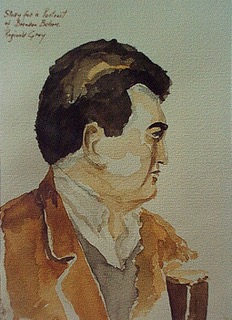Brendan Behan was born after the foundation of the Irish Free State and during the Civil War, on 9 February 1923, into a working-class family of house-painters. Behan’s people sided with the Republicans. One of Behan’s uncles, his mother’s brother Peadar Kearney, wrote “A Soldier’s Song,” and another uncle, P. J. Bourke, was involved in the Irish theatre movement.
When Behan left national school he became apprenticed to a house-painter, his father’s and grandfather’s trade. He joined the Republican youth movement, Fianna Éireann, in 1932. In 1939, at the age of sixteen, he joined the IRA, and became messenger for the chief of staff, Seán Russell. When in 1939 the IRA decided to launch a military campaign in Britain, Behan became part of this.
We get a good idea of this from Behan’s autobiographical novel Borstal Boy (1958), in which he describes how he travelled to Liverpool in late 1939 carrying explosives and his subsequent capture. When he returned to Ireland in 1941 he was already classified as a communist suspect.
There followed imprisonment in Mountjoy Gaol, Arbour Hill, and then in the Curragh Camp, experiences recorded in his memoir Confessions of an Irish Rebel (1962). While in captivity in Irish prisons Behan began to study Irish. He later spent a great deal of time on the Great Blasket Island off the Dingle Peninsula. Here, native Irish-speakers were steeped in the wealth of Irish poetry and song. Behan took to this like a natural cultural habitat, and his best poetry is in Irish.
In his Irish-language writing Behan targets the conservatism of the middle-class bureaucrats in constraining the living language of the dispossessed of the Gaeltacht by assuming an artificial “superiority.” Other Irish-language writers, such as his contemporary Máirtín Ó Cadhain, or later Tomás Mac Síomóin, also highlight this administrative stranglehold on the language. Behan expresses in his writing a vision of an Irish language revival that was opposite to the hijacking of the language by middle-class officialdom.
Behan’s breakthrough play, The Quare Fellow (1954), is set in Mountjoy Gaol. The play’s title hero never appears—his death sentence, for fratricide, is to be executed the next day, and there are certain echoes of Oscar Wilde’s “Ballad of Reading Gaol.” Like The Hostage (1958) later, The Quare Fellow comments on the gulf between the existing Irish Republic and the aspirations the Republicans had fought for. What emerges here, and in The Hostage, is a society in which the flag has changed colour but the same kind of people remain in charge.
Behan’s friendship with his cousin Cathal Goulding continued throughout this time. By the mid-1950s it had become clear that the campaign simply to remove the inner-Irish border was not succeeding. Between then and the early 1960s Goulding, who was a leading activist and member of the IRA leadership in the 1950s, chief of staff throughout the 1960s, had rethought the political assessment and policy. He saw that unification of the country was only one objective, but there was another developing dimension to Irish independence: dealing with the different neocolonial occupiers coming into the south of Ireland.
The concept of an Irish Republic needed to be newly defined in terms of the people who live in it. Behan’s work shows that he fully agreed with this concept of an Irish republic.
Borstal Boy fictionalises Behan’s time spent in prisons. Charlie, a Royal Navy sailor and Cockney petty thief, becomes a close friend. An Irish warder, on the other hand, is hostile towards him. And a Catholic priest encourages Protestant warders to beat up Behan, betraying his alliance with the enemy against the inmates.
Through this plot, but also through his language, Behan shows how much common ground exists between Catholic-Irish and Protestant-English workers, making extensive use of numerous dialects of English as spoken by the British working class in different regions. In addition, he uses song and poetry, but also references the Irish language. The book describes Behan’s distancing from violence while remaining a principled Irish patriot.
Behan’s play The Hostage is set in a shabby Dublin tenement, which is a bizarre reflection of Irish society in 1960. Pat, a veteran of the Irish liberation struggle, passes the day trying unsuccessfully to avoid any political involvement. An IRA officer brings Leslie Williams into his house, a kidnapped young English conscript who is held hostage for an 18-year-old IRA prisoner sentenced to death in Belfast.
Much as in Borstal Boy, the audience is shown a likeable working-class English soldier, who gets shot accidentally in senseless crossfire, underlining Behan’s non-sectarian attitude to working-class English people. His overriding sympathy lies with the people who suffer, never with the beneficiaries of history, and he always examines closely the political purpose of actions in this light.
Behan also saw himself as a republican and a socialist. His relationship with the Communist Party was a friendly one. For example, he painted the party premises free of charge, and in 1954 he signed the nomination papers of Michael O’Riordan, who stood in the general election that year. When O’Riordan received barely 300 votes, Behan said: “Well done on the 295 mortal sinners!”
Above all, Behan’s goal was a united Irish Republic, which would serve the interests of the many, not the few. This opinion, of course, did nothing for his popularity with the Irish literary and political establishment.
When Behan had become an internationally famous author by the early 1960s, he spent much time in the United States. Here he met Bob Dylan, Allen Ginsberg, Jackie Gleason, Norman Mailer, Harpo Marx, Arthur Miller, Tennessee Williams, and others. However, his fame exacerbated his alcoholism, and this, along with diabetes and jaundice, disastrously affected his health. He died on 20 March 1964, aged 41.






